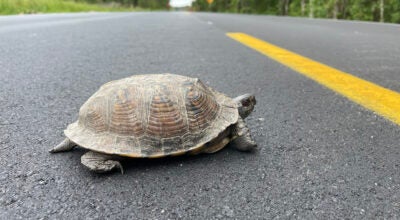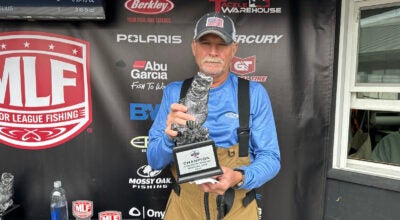Quail Habitat Restoration
Published 12:00 am Tuesday, September 8, 2009

Yalobusha County Economic Development Director Bob Tyler (left) discusses the economic impact from hunting and fishing in Mississippi with Panola Partnership Director Sonny Simmons and Mississippi Department of Wildlife, Fisheries and Parks Deputy Director Al Tuck. Photo submitted
The 4,000 acre Wildlife Management Area, located south west of Sardis near Davis Chapel, has been targeted by the Mississippi Department of Wildlife, Fisheries and Parks (MDWFP) to mount an extensive quail habitat restoration project. The project will be the first of its kind on a state-operated Wildlife Management Area where the primary mission is geared toward quail.
The acreage was purchased by the state in 2002 and initially closed from hunting as work began to transform the former Hamer Farm into a high quality WMA. By last year quail habitat restoration was full-speed ahead, and the WMA was named Charles Ray Nix Wildlife Management Agency (CRNWMA), honoring former Mississippi Senator Charles Ray Nix.
Nix was a former Mississippi Senator who had served as chairman of the state’s Conservation Committee.
A field day was held in Panola County last Thursday, as MDWFP officials unveiled their long-term plans for the new WMA. The day was also the first official meeting with all of the participants involved in this project, which included officials with the MDWFP, Nix and his family, and a variety of other state officials and several quail experts.
The morning portion of the field day was diverted to the Panola Country Club after CRNWMA had been drenched from a downpour the night before.
“I have an opportunity with my job to travel all over the country, and Mississippi has some of the best work going on across the country,” Roger Wells, National Habitat Director for Quail Unlimited, told Dr. Polles and his staff as introductions were made at the country club’s dining area.
Wells had made the trip from his hometown of Kansas to CRNWMA last year, offering input for long range planning to help create quail habitat. With Wells was Dr. Ed Lloyd, Chairman of the Oktibbeha Chapter of Quail Unlimited; and Quail Unlimited Regional Director for Mississippi, John Calhoun.
A Work In Progress
Dr. Polles and MDWFP biologists touched on work that is already underway geared toward creating quail habitat at the WMA. These accomplishments include thinning approximately 475 acres of hardwood, controlling kudzu, Johnson grass and sweetgums outbreaks, removing underbrush in hardwood areas, conducting controlled burns, planting 1,000 shrubs in plots scattered throughout the retired agricultural fields, planting native grasses and summer plots.
Although the habitat is geared for quail, state biologist said the work would benefit other game at the WMA.
The WMA’s Namesake
Last October the Governor’s office announced the state’s newest WMA would be named for Charles Ray Nix.
Nix served as state senator from 1972 through 1988 before being selected to serve as executive director of the South Panola Area Chamber of Commerce.
Joining Nix at last Thursday’s field day was his son, Chuck Nix, and son-in-law, Bobby Reid
“There are a lot of people I got to thank for doing this,” Nix told the group.
Looking Ahead
Plans were also unveiled to construct a new building at the CRNWMA, a 4,000 square foot facility that would include a community room and kitchen to provide space of future events. Clark Gordin, Executive Director of the Foundation for Mississippi Wildlife, Fisheries and Parks, also reported that shooting events and training will also be offered at CRNWMA.
Even more important, as explained by Dr. Polles, was the bigger picture, the impact the state’s outdoor resources provide as an economic engine for the state. This creates an estimated $785 million industry in the state, creating more than 20,000 jobs, Dr. Polles reported, pointing to the money spent by outdoorsmen.
“We are competing with other states,” Dr. Polles added.





